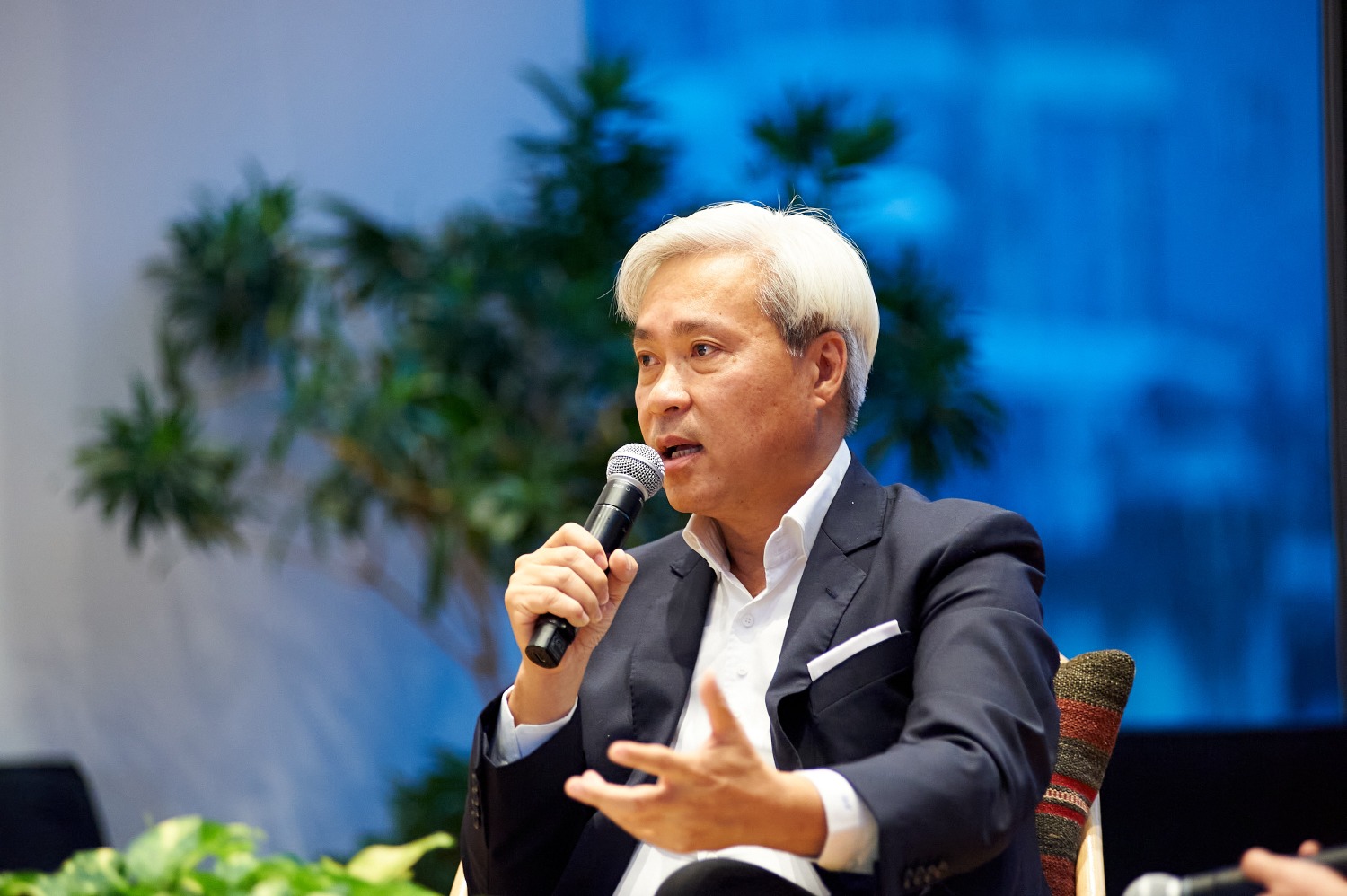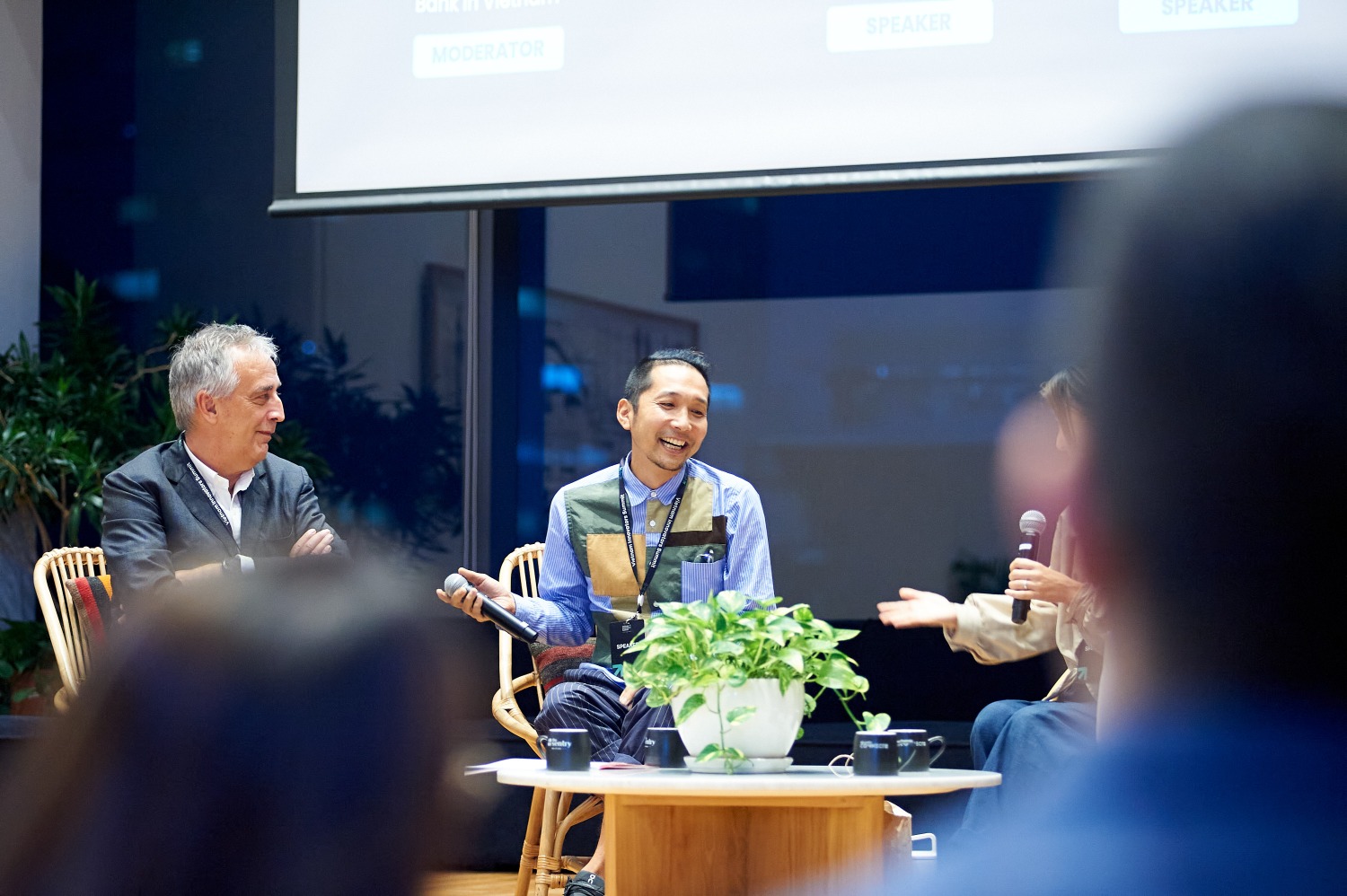Industry Insights Session is part of Vietcetera’s Vietnam Innovators Summit program. The third Industry Insight Session focused on Vietnam’s climate future and the role ESG strategies of companies play in the country’s green transition. Moderated by Standard Chartered Vietnam’s CEO Michele Wee, the event gathered Don Lam (VinaCapital), Holly Bostock (Heineken Vietnam), Masuko Yosuke and Sanae Takasugi (Pizza 4P’s), and Gricha Safarian (Puratos Grand-Place Indochina) at The Sentry.
Much has been written about Vietnam’s climate change future. The country, one of the most densely populated in Southeast Asia, is also the most vulnerable in the region. Environmentalists and scientists have repeatedly warned that unmitigated climate change could threaten to wipe out decades of Vietnam’s hard-won economic growth.
Read: Ho Chi Minh City Is Sinking Fast
The Vietnamese government has already created comprehensive strategies to go carbon-neutral by 2050. At the recently concluded COP27, the coal-dependent country highlighted that shifting to clean energy is the key to fulfilling its climate commitments.
Several private enterprises have also pledged to put sustainability at the forefront of their operations. In September, car manufacturer VinFast joined the global climate pledge – the first domestic company to do such.
However, putting one big sustainability plan for all of Vietnam’s economic and social sectors would be an impossible task. Each sector. from agriculture to manufacturing, construction and F&B, will need a specific game plan. And they will need funding — huge funding.
“Vietnam needs more than $300 billion to achieve net-zero carbon emissions,” said Don Lam, founding partner at VinaCapital Group.

“I was with the prime minister at the COP26. The delegation was surprised when PM Chinh announced that Vietnam would achieve net zero by 2050. But we were proud to see Vietnam stepping up.”
The investment management firm has already started pouring multimillion-dollar investments into Vietnamese companies that are on a mission to help Vietnam go green. One of the 60 firms within its portfolio is SkyX Solar, a solar rooftop power developer focusing on the commercial and industrial space.
VinaCapital allocates at least $1 billion for environment-friendly initiatives and is currently working on a $3.3 billion project to turn a coal-fired power plant into a renewable energy source.
“For companies we invest in, we educate them into putting ESG in their businesses. That’s how they would survive. For our sustainability pledges to work, it’s important for these firms to replicate the movement.”
Don admitted, though, that the biggest resistance comes from family-owned businesses. Having built and grown their businesses through traditional business models, pushing for a change would take a lot of convincing.

“They have this “nobody-cares-about-those-things mentality,” said Don. “What we do is we go to the next generation of owners and educate them. It’s always the son and daughter of the founders that can make the biggest influence.”
Transitioning to net zero will have massive social and economic impacts. It will affect millions of people and industries. That’s why there are considerations and factors that need to be weighed before any big move, he explained. But not moving would also cost a hefty amount. More than 50% of the GDP will be impacted if Vietnam doesn’t follow ESG.
The green transition is no longer a matter of whether or not Vietnam is willing to do it. “It’s a necessary move,” Don said.
Taking concrete actions
Dutch brewing company HEINEKEN is one of the most active private enterprises to formulate and implement concrete actions toward sustainability in Vietnam. It’s been awarded one of the top 3 most sustainable companies for six consecutive years.

HEINEKEN Vietnam’s six breweries use biomass energy and aim to use 100% renewable energy by 2025 – five years earlier than HEINEKEN Global. Moreover, the brewing company releases zero waste to landfills, a feat it has achieved since 2021.
“We’ve also announced that we will be achieving water balance. We are working to achieve that by 2025 through reforestation and restoring wetlands,” said Holly Bostock, Corporate Affairs Director of HEINEKEN Vietnam. Water balance means replenishing the same volume of water taken from natural resources. “We are halfway there.”
“To achieve this, you need to have plans, goals, and strategy and be bold enough to announce these goals even before knowing if you’re actually going to achieve them. Setting goals and making them transparent will motivate you to take action,” added Holly.
Aside from making sure they produce 12 million cans daily, HEINEKEN Vietnam is also working hard to engage its 3,000 employees and 46 other companies in its ecosystem to the company’s sustainability goals. It has established a dedicated sustainability department that sets clear governance and does strategic reviews of what’s been done and how the brewing company can move forward with its sustainability agenda.
For popular restaurant chain Pizza 4P’s, small steps lead to more significant leaps in terms of sustainability actions. The company has always been centered around sustainability since its first restaurant opened in Saigon in 2011. It continuously spreads happiness through its products and opens different avenues designed to be an educational center where guests can learn about sustainability.

“ESG is not a responsibility for us, but a fundamental part of our business strategy,” shared Sanae Takasugi, Deputy CEO of Pizza 4P’s. The restaurant chain leads by example with the compost pit within their premises, promoting a circular economy and showing customers tangible actions.
Restaurant founder and CEO Masuko Yosuke, who narrated that Pizza 4P’s started with him realizing a different sense of happiness when he made pizza on a wood-fired oven he made himself, that the business’ primary purpose is to generate value for the whole society. This is why all processes and supply chains of Pizza 4P’s follow sustainable practices.
Masuko admitted that they have yet to make a solid move to reach net zero in their business, but they’re actively seeking ways and means to take positive actions to make it a possibility.
“We’re working on who we can partner to make our sustainability goals a reality. Little by little, we ensure that everything we do doesn’t harm the environment,” Sanae agreed.

The founder of Puratos Grand-Place Indochina, Gricha Safarian, also shared how he took a totally new approach to the cocoa and chocolate supply chain in Vietnam, noting that the “delicious industry” actually has one of the cruelest supply chains and labor abuses in the world.
“We created Puratos about 25 years ago to introduce a very innovative and disruptive supply chain that addresses quality issues, reforestation, and labor situations in the cocoa industry. We are leading a sustainable chocolate movement,” Gricha shared.
Gricha also co-founded the Sustainable Cacao Institute, a think tank based in Brussels that conducts in-depth research toward a more sustainable and ethical future for the industry.
“Our purpose is not profit for profit, but profit for a higher purpose, which means we want to empower consumers and companies to exert effort into sustainability. People now pay attention to what companies are doing and are starting to lean more toward brands that promise environmental preservation,” Gricha said.
“Changing business models into one founded on sustainability should not be considered a cost, but an investment. Because the later you start, the more expensive it will get. The sooner you take action, the better your competitive advantage is.”
Some photos from the Industry Insights Session: Vietnam’s ESG And Climate Change Future:







